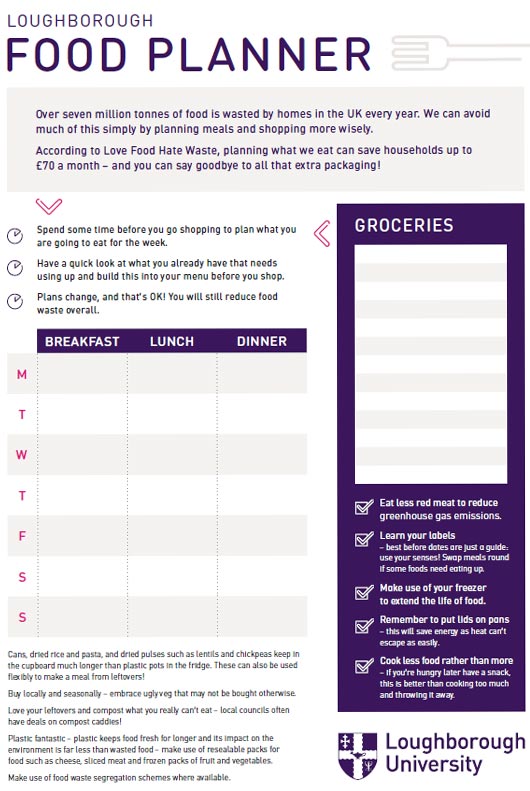Dr Rhoda Trimingham, of the Design School and the Sustainable Design Research Group, has used her expertise to create the ‘Loughborough Food Planner’ as she believes it’s time for society to take action and accept a huge amount of food waste comes from households.
According to the Waste and Resources Action Programme (WRAP), a total of 7.1 million tonnes of food is thrown away by homes each year and 5 million tonnes of which is deemed to have been edible and worth a staggering £15bn.
The Loughborough Food Planner aims to get staff, students and the wider community planning their meals and considering how best to use up leftover food.
It encourages people to create shopping lists and to map out a week’s worth of meals to avoid waste and excessive purchasing.
The Planner - which is particularly relevant today (Wednesday April 24), as the Compass Group is celebrating Stop Food Waste Day - also acts as a resource of information as it contains a variety of useful tips such as:
- Learn your labels – best before dates are just a guide: use your senses. Swap meals round if some foods need eating up
- Cans, dried rice and pasta, and dried pulses such as lentils and chickpeas keep in the cupboard much longer than plastic pots in the fridge. These can also be used flexibly to make a meal from leftovers
- Cook less food rather than more – if you’re hungry later have a snack, this is better than cooking too much and throwing it away.
Of the Loughborough Food Planner, Dr Trimingham said: “There is a lot of media attention around plastic waste currently, however in terms of negative effect on climate change food waste is far more harmful, so I wanted to address this.
“We agree that governments and food manufacturers need to make some pretty big systemic changes to food production and consumption, but we must accept that a lot of food waste comes from households and so changing our behaviour towards the way we buy and eat food is a key way we can mitigate against climate change.
“Planning what we eat is a simple way to reduce food waste and can also have a positive effect on our health and our wallets.
“By reducing the food we waste, we can also reduce our consumption of plastic packaging – as all food comes wrapped – so this was a win-win opportunity.”
![]()
Dr Elliot Woolley, Senior Lecturer in Sustainable Manufacturing in the School of Mechanical, Electrical and Manufacturing Engineering, and the University’s Sustainability team have assisted with the creation of the Loughborough Food Planner. Karl Hurn from the Design School provided graphic design support.
Dr Woolley commented: “Being able to reduce the level of food waste produced in the UK is one of the greatest challenges facing modern society.
“Planning what you are going to eat and buying only that food is the most important stage in reducing food waste.
“This new Food Planner provides a simple and effective way of doing this. By reducing the number of unplanned purchases – or ‘impulse buys’ - it is more likely that you will consume your food before it goes off, reducing waste, saving money and preventing the potential for overconsumption.”
Nik Hunt, Loughborough University’s Environmental Manager, added: “From an environmental perspective, food waste has a significant impact producing methane if landfilled, but there are also all the issues around the wasted resource and the environmental impacts of producing the food initially.
“This Food Planner provides a great opportunity to tackle both the environmental and cost impacts of food waste.”
The Loughborough Food Planner can be downloaded for free here: loughborough-food-planner.pdf

